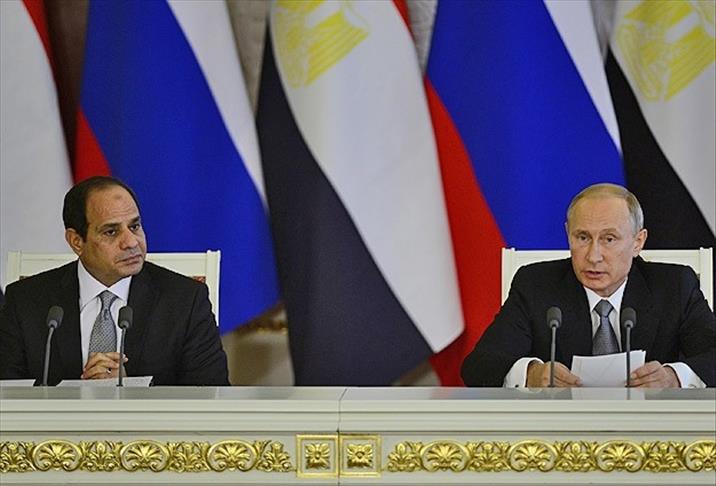
CAIRO
Egyptian President Abdel-Fattah al-Sisi has embarked on another visit to Russia, his third since he came to office last year following a military coup against Egypt’s first democratically-elected civilian president.
The visit, which began on Tuesday, reflects a major rapprochement between the two countries, whose relations have significantly improved since the 2013 coup against President Mohamed Morsi.
The Egyptian presidency said the visit aimed to “boost strategic relations” between Egypt and Russia.
Relations between Egypt and the Union of Soviet Socialist Republics (USSR) date back to 1784 when Russian Empress Yekaterina Alexeevna named the first Russian consular-general to Egypt’s coastal city of Alexandria.
In 1862, the Russian Empire opened its first consulate in Cairo with a view to enhancing its role in the Middle East.
In 1917, around 10,000 Russian immigrants fled to Egypt after the Bolshevik revolution in Russia. Many of them, however, were expelled under pressure from the Russian consulate.
Two years later, Soviet leader Vladimir Lenin sent a letter to Egyptian politician Saad Zaghloul, reiterating his support for Egypt’s 1919 revolution and offering help to the Egyptian people against British colonizers.
In 1923, the Egyptian government issued a decree withdrawing its recognition of the Tsarist Russian consulate.
Twenty years later in 1943, Egypt and the USSR signed an agreement to exchange Egyptian cotton for Soviet grain and wood.
Relations between the two countries significantly improved after the 1952 revolution, which brought an end to the monarchy in Egypt.
The USSR provided help for several major projects in Egypt, including the building of the Aswan High Dam.
In 1956, the USSR threatened to bomb Israel, Britain and France unless they withdrew their troops from Egypt in what becomes known as the “Tripartite Aggression” in response to Cairo's nationalization of the Suez Canal.
Following Israel’s occupation of Egypt’s Sinai Peninsula during the 1967 Arab-Israeli war, the USSR sent 10,000 military experts to Egypt to help rebuild its army. It also helped Egypt build an air-defense network in 1970.
Relations between Egypt and the USSR cooled in 1970 following the death of Nasser and the appointment of his deputy Anwar Sadat. Egypt’s relations with the USRR further deteriorated after the signing of a peace treaty between Sadat and Israel in 1979.
Relations between the two countries began to improve under Hosni Mubarak, who became Egypt’s president after Sadat’s assassination in 1981.
In 1997, Mubarak visited Russia for the first time. He paid two more visits in 2001 and 2006. Russian President Vladimir Putin also visited Egypt in 2005.
In 2011, Russia reacted with caution to the Jan. 25 revolution that ousted Mubarak.
Two years later, Morsi, who succeeded Mubarak in Egypt’s first free elections, visited Russia for bilateral talks. During the visit, Putin pledged military and economic assistance to Egypt.
The two countries, however, remained at odds over the Syrian revolution. While Moscow called for support for Syrian President Bashar al-Assad, Cairo called for his ouster.
In July 2013, Russia supported the ouster of Morsi by the Egyptian military, refusing to describe his overthrow as a military coup.
Russian authorities also failed to condemn the violent dispersal of two pro-Morsi sit-ins in Cairo in August 2013, which left hundreds of protesters dead.
Russia, a permanent member of the UN Security Council, also opposed any UN statement condemning Egypt’s new military-backed government.
Anadolu Agency website contains only a portion of the news stories offered to subscribers in the AA News Broadcasting System (HAS), and in summarized form. Please contact us for subscription options.







